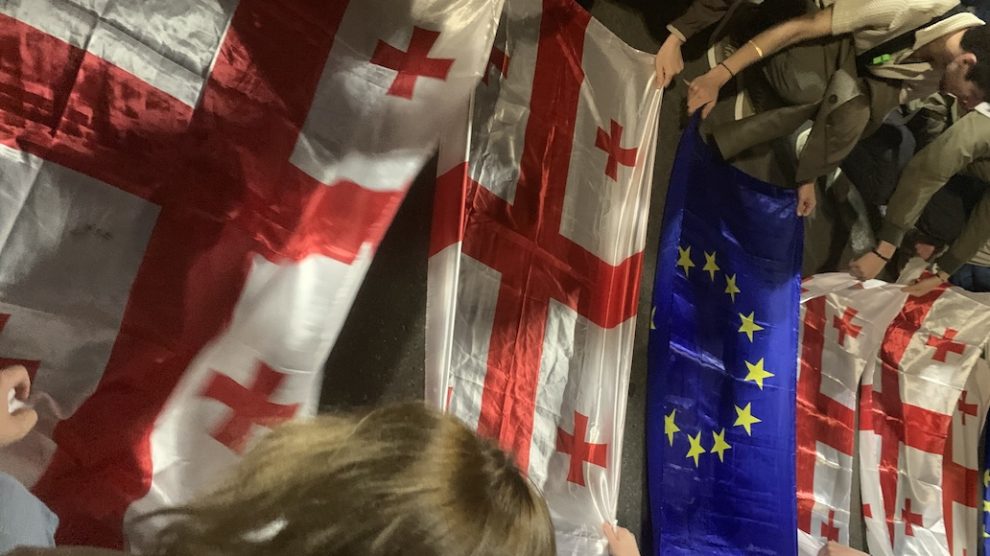Georgia’s struggle with the “foreign agents” bill highlights broader issues of democratic backsliding and geopolitical tug of war. The law is seen as a threat to civil society and democratic principles, prompting widespread protests and international condemnation.
Georgia’s political situation is deeply entangled in the broader geopolitics of the region, significantly influenced by Russian hybrid war in the region and the ongoing war in Ukraine. This war not only challenges democratic norms but also contributes to a rising tide of autocratic governance across Eastern Europe and the Caucasus.
Amid these developments, the Georgian people find themselves potentially the next victims, positioned on the front lines of this geopolitical struggle.
- Why Georgia’s ‘foreign agents’ bill is so problematic
- The success of the EU’s 2004 enlargement must drive a new wave of expansion
- Much of emerging Europe is falling behind on its commitment to equality
The recent approval of Georgia’s “foreign agents” bill has ignited significant protests and criticism both domestically and internationally.
President Salome Zourabichvili vetoed the bill on May 18, but according to her, this is only a demonstration of the vast majority of the Georgian people who oppose the law. The ruling Georgian Dream party, widely seen as aligned with Kremlin interests and informally led by Bidzina Ivanishvilli, is expected to override this decision due to the majority in the parliament. This contentious bill places restrictions on organisations receiving overseas funding, which critics argue will stifle civil society and democratic engagement in Georgia.
The situation in Georgia is becoming increasingly volatile as parliamentary elections, scheduled for October 26, 2024, approach. These elections are the first since Georgia gained EU candidacy status in December 2023, a milestone that had been seen as a step towards a more democratic and European-oriented future.
However, the passage of the “foreign agents” bill and the subsequent violent crackdowns on protesters have disillusioned many Georgians, exacerbating political polarisation.
A deepening crisis
The Rose Revolution of 2003 established the framework for Georgia’s democratic government as if leaving behind the Soviet legacy and firmly turned its face toward the West. However, much has changed since then, with the establishment of Georgian Dream in power. And now, the upcoming elections are perceived by many as a mere formality rather than a genuine democratic process.
The deepening political crisis and the erosion of civil liberties have led to fears that Georgia might face a revolution this fall. If the current trajectory continues, Georgia risks becoming another Belarus, with a repressive regime quelling dissent and undermining democratic institutions.
To prevent this, the only viable solution appears to be strengthening transnational civil society links. This approach challenges traditional notions of international relations by fostering a global civil society based on a social contract that transcends national borders. Historically, civil society has been territorially bound, contrasting with the state-centric nature of international relations. However, the evolution towards a global civil society involves negotiating new social contracts across borders, involving both states and international institutions.
Civil society needs effective political leadership
Georgia has indeed made notable progress in democratisation since the Rose Revolution, prioritising the development of democratic institutions and the protection of civil liberties. However, despite these efforts, there remain challenges in effectively safeguarding democratic principles.
While civil society plays a vital role in monitoring government actions and advocating for transparency and accountability, there are persisting obstacles that hinder its effectiveness in fully realising democratic aspirations.
In Georgia, the lack of effective political leadership within civil society is a significant hurdle. Many civil society actors are struggling to emerge as credible political leaders who can articulate the people’s desire for EU integration. This leadership gap highlights a failure not only within Georgia but also among the international community and the West, which have not effectively supported the country’s democratic aspirations.
In conclusion, Georgia’s struggle with the “foreign agents” bill highlights broader issues of democratic backsliding and geopolitical tug of war. The law is seen as a threat to civil society and democratic principles, prompting widespread protests and international condemnation. Georgia’s political climate is tense and there is a good chance of major change as the country gets ready for its parliamentary elections. Strengthening transnational civil society links and addressing the leadership gap within the country are essential steps to support Tbilisi.
Without these, Georgia’s civil society and 89 per cent of Georgians who have aspirations for democracy and closer ties with the European Union may find their hopes unfulfilled.
Unlike many news and information platforms, Emerging Europe is free to read, and always will be. There is no paywall here. We are independent, not affiliated with nor representing any political party or business organisation. We want the very best for emerging Europe, nothing more, nothing less. Your support will help us continue to spread the word about this amazing region.
You can contribute here. Thank you.


